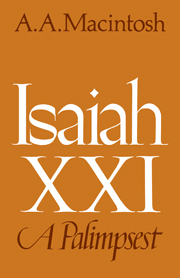Summary
History and exegesis
The impression gained by a number of scholars that the Dumah oracle and the Arabian oracles reflect the same general historical circumstances has been noted (pp. 9iff). By way of summary, three considerations may be advanced in support of this view: first, both are concerned with the geographical area to the south of Judah; secondly, they are both marked by similar dialectal features; thirdly, they are juxtaposed.
Again arguments have been advanced above to suggest that the oracles pre-date the sixth century B.C.; in particular (pp. 93ff) there is evidence that the sixth-century Edom oracle of Jer. xlix yffknew and made use of Isaiah's (Arabian) oracle. Further (pp. 98f, 102), it is argued that the epilogues to the Moab oracles (cf. Isa. xvf) and to the Arabian oracle come from the same hand and derive from the sixth century; one of them (Isa. xvi 13) explicitly states that the material to which it is appended was ‘the word that the Lord spake concerning Moab in time past’.
Finally, literary considerations and in particular comparison of the Moab oracles (Isa. xvf) with Isa. xxi 1 iff suggested that these oracles reflect the period of the Assyrian attacks on southern Palestine and Arabia at the end of the eighth century B.C. (see pp. g8ff).
In order to gain further insights into the oracles of Isa. xxi 1 iff it is necessary to turn again to the evidence provided by the sixth-century oracle of Jer. xlix 7ff. The evidence that the latter chapter affords is likely to be of a sort with that which Jer. If yielded for the elucidation of Isa. xxi 1–10.
- Type
- Chapter
- Information
- Isaiah XXIA palimpsest, pp. 131 - 143Publisher: Cambridge University PressPrint publication year: 1980



